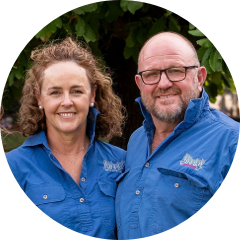Case studies: Improved drought resilience through optimal management of soils and available water
OPTIMAL SOIL AND WATER MANAGEMENT INCREASES DROUGHT RESILIENCE — FROM THE PLOT TO THE PADDOCK
Drought is an inevitable part of farming in Australia, and outcomes from the Improved drought resilience through optimal management of soils and available water project are equipping farmers with a host of additional strategies with which they can prepare for the inevitable.
Numerous small-scale field trials across southern NSW have shown that early sowing of slower-maturing crops, diverse legume rotations and nitrogen banking can all increase profitability and productivity by increasing soil moisture availability and preventing carbon and nutrient loss under drought conditions. But proving these practices are profitable on a paddock scale is key to ensuring grower adoption.
As part of this project, Riverine Plains and our project partners spoke to a number of farmers currently using these strategies in their farming systems. See their insights and learnings in the following written case studies and videos!
Project investment
Partners
Focus areas
Related Research On
Case studies: Improved drought resilience through optimal management of soils and available water
-
This project aims to show how farmers can use legumes, early sowing and nitrogen banking to safeguard the natural capital of soils for environmental and economic sustainability.
MORE ON Sustainability & Grains
Our research enhances food production, increases environmental resilience and improves community connection across the Riverine Plains. See how our research creates impact.
-
Grains
Sustainability
-
Business
Sustainability
-
Livestock
Sustainability
-
Grains
Business
-
Grains
Sustainability
-
Grains
Livestock
-
Grains
Livestock
-
Soils
Sustainability
-
Soils
Sustainability
-
Grains
Sustainability
-
Grains
Business
-
Sustainability
Drought
-
Sustainability
-
Grains
Sustainability
-
Grains
-
Grains
-
Soils
Grains
-
Soils
Sustainability
-
Grains
Soils
-
Drought
Grains
-
Soils
Grains
-
Grains
-
Grains
Soils
-
Soils
Grains
-
Fodder
Grains
-
Grains
-
Soils
Sustainability
-
Grains
-
Soils
Sustainability
-
Grains
Soils
-
Sustainability
Grains
-
Grains
Sustainability
-
Soils
Grains
-
Grains
Sustainability
-
Livestock
Grains
-
Grains
Soils
-
Sustainability
Grains
JOIN RIVERINE PLAINS
Riverine Plains provides opportunities to see new research and innovation, connect with rural communities, and attend informative events.










